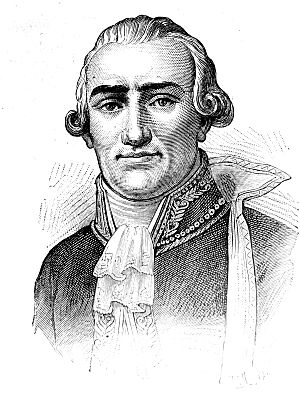Nicolas François de Neufchâteau facts for kids
Nicolas François de Neufchâteau (born April 17, 1750 – died January 10, 1828) was an important French statesman. He was also a poet and a scientist who studied agriculture.
Contents
Biography
Early Life and Talents
Nicolas François de Neufchâteau was born in Saffais, a town in France. His father was a schoolteacher. He went to college in Neufchâteau.
When he was only 14 years old, he published a book of his own poems. A famous writer named Voltaire was very interested in his work. By the age of 16, Nicolas was already a member of some of France's most important academies.
In 1783, he became a top legal official in Saint Domingue. Before this, he had started translating a long poem by Ariosto. He finished it before sailing back to France five years later. Sadly, his translation was lost when his ship was wrecked on the way home.
During the French Revolution
During the time of the French Revolution, Neufchâteau was chosen to help organize the Vosges region. He was later elected to the Legislative Assembly. He served as its secretary and then as its president.
In 1793, he was put in prison. People thought his play, Paméla ou la vertu récompensée, showed political ideas they didn't like. But he was set free the next year. This happened when the Thermidorian Reaction began, which changed the political mood.
Serving the Directory and Napoleon
In 1797, Nicolas François de Neufchâteau became the Minister of the Interior. He was known for being very good at managing things. He helped start France's system of canals for boats.
He also helped open the famous Louvre museum. He was one of the people who started the first big exhibition of industrial products in France. This was called the Exposition des produits de l'industrie française.
He later joined the French Directory, which was the government of France at the time. He served there from September 1797 to April 1798.
From 1804 to 1806, he was the president of the Senate. During this time, the First Empire was created. His job meant he was the one who asked Napoleon Bonaparte to become Emperor.
In 1803, he became a member of the Académie française, a very respected group of French scholars. In 1808, he was given the title of count. He stopped working in public life in 1814. After this, he spent his time studying agriculture until he passed away.
His Many Works
Nicolas François de Neufchâteau achieved many things. He was interested in a wide range of topics. However, he is most famous for his work as a statesman. He helped encourage and develop industries in France. His later poems are not thought to be as original as the ones he wrote when he was young.
He was also a well-known grammar expert and literary critic. He edited important works by Blaise Pascal and Alain-René Lesage. He also wrote many books about agriculture.
See also
- Les Neuf Sœurs
- In Spanish: Nicolas François de Neufchâteau para niños
 | Delilah Pierce |
 | Gordon Parks |
 | Augusta Savage |
 | Charles Ethan Porter |


